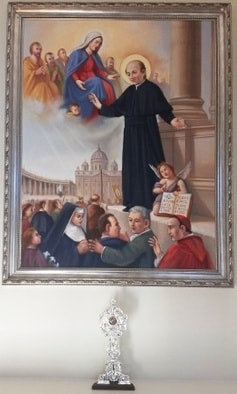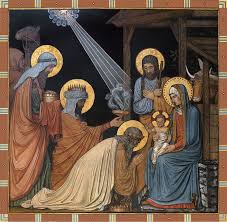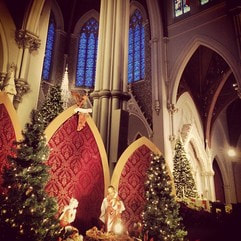|
Every Feast Day or Solemnity in which the Church honors Mary, it seems that with a great deal of consistency church music directors across the country choose to make (Composer’s) Hail Holy Queen a part of the Mass for that day. Without fail, whenever I hear this song, I can’t help but crack a smile as everything in me wants to break into the song and dance of Sister Mary Clarence and her fellow nuns found in the hit 1992 movie Sister Act.
Sister Act follows the story of Delores Van Cartier, a lounge singer in Reno who witnesses her lover, an undercover mafia member, murder one of his assistants. After escaping, authorities place her in witness protection at St. Catherine’s Convent where she takes on the guise of a nun, becoming Sister Mary Clarence. At first she has a great deal of difficulty keeping up with the daily schedule of early mornings, prayer, fasting and the simple lifestyle but soon finds a home putting her music background to work directing the choir (in much need of the help, I might add). A classic film among my family, I recently revisited this movie over the holidays. At one point there’s a conversation in which the Mother Superior chastises Sister Mary Clarence for sneaking out at night with the other sisters to visit one of the neighborhood bars. While the Mother Superior sees the convent’s walls as a means of protection, Sister Mary Clarence argues that they prevent the Sisters from going out into the community. Later we see a softening of the Mother Superior’s heart as she allows the Sisters to go out into the surrounding inner city neighborhood to meet and embrace the people. Not to mention, the improved musical styling of its choir, under Sister Mary Clarence’s directorship has struck a chord with the surrounding youth of the area (just look at marker 1:48 in the video). While these moments may scream of a 1990’s, somewhat cliché filmmaking style, today it also screams something else to me – the new evangelization. Once the sisters move beyond the walls of the convent they begin to take on what Pope Francis refers to in his Apostolic Exhortation, Evangelii Gaudium, as an “Evangelizing Community.” Pope Francis elaborates, saying, “An evangelizing community knows that the Lord has taken the initiative, he has loved us first (cf. 1 Jn 4:19), and therefore we can move forward, boldly take the initiative, go out to others, seek those who have fallen away, stand at the crossroads and welcome the outcast” (24). As we see images of the sisters jumping rope and dancing with teenagers on the street, handing out food to the homeless, creating a safe playground for children, and greeting patrons in front of a local adult video store, it’s clear they have embraced those on the fringes of society and welcomed them. Pope Francis emphasizes that “an evangelizing community is filled with joy; it knows how to rejoice always” (24). If there’s any doubt about the joy of these Sisters just listen to their rendition of Hail Holy Queen and try not to crack a smile the next time to you hear it at Mass. And don’t forget to share that joy with someone else! David Burkey is the Communications Coordinator for the Catholic Apostolate Center
0 Comments
There are many places in life where we find joy. Often times, I find joy in my family – going home for holidays and being with the people that I love the most. I find joy in my friends – a second family that arguably knows me best. I find joy in my work – encouraging others to support an institution that means so much to not only me, but also to the Church in the United States. When I think of my Catholic faith, I can only think of joy. This was especially evident during the recent election of a new Pope when I saw the entire world rest its eyes on our Church. It gave me great joy to answer people’s questions about my faith, help them to learn more about what it means to be Catholic, and strengthen my own faith. Joy in our faith can be found in a variety of different contexts. The one place where I find the most obvious joy, however, is within the hymns and songs of praise that are sung so beautifully in churches throughout the world. Over this past Triduum and Easter Sunday I heard magnificent music that brought people to tears.. One thing which astounds me every time I attend Mass is that it doesn’t matter if you can sing or not – liturgical music is meant to be sung by anyone. The entire congregation is meant to join in and sing their praise to God. You can see visually the people around you either belting their notes or perhaps listening intently to those around them. Whichever way one chooses to participate, there is no doubt that you can find Joy within the music both sung and played. One of the things I like to do immediately upon entering a pew is to figure out what hymns are going to be sung as the processional and recessional. If I don’t know the hymns, I try to hum the notes to myself in an effort to learn before the music starts. When the organist starts playing, I am transported – if only for a few brief moments – to a place of Joy. The people singing around me are all focused on one thing: praising God, saying thank you for giving us this day, and joining together to start off their week on the right foot. As I was writing this post, I stopped to go to Mass in downtown Washington, DC. Again, the music chosen immediately brought me into the moment. Each liturgical season brings with it an amazing group of hymns. Everyone I’ve spoken to have their favorites, especially at Christmastime. As for me, I’m a sucker for Easter hymns. Whatever the case may be, liturgical music has a way of bringing us closer to God in so many ways. Next time you’re at Mass, take it in – notice that everyone around you is all focused on the same thing: praising God and thanking him for giving us this day. What’s my favorite hymn? Too many to choose from, but I’ll leave you with this beautiful piece of music that I think anyone can appreciate – especially when you least expect it. Chris Pierno is the Media and Marketing Manager for the Catholic Apostolate Center. Editor's Note: This post was originally published on April 25, 2013 "Remember that the Christian life is one of action; not of speech and daydreams. Let there be few words and many deeds, and let them be done well." – St. Vincent Pallotti
Blessings to all on the feast of St. Vincent Pallotti! Some may ask, “Who is that?” I am glad that you asked. St. Vincent Pallotti and his charism are the reason why the Catholic Apostolate Center exists. He was a priest of the Diocese of Rome in the first half of the nineteenth century. His ministry spanned the poor to popes. It did not matter what a person was, but who the person was, an image and likeness of God, the Infinite Love. He saw all people as gifted by God with talents that were meant to be shared. On January 9, 1835, St. Vincent Pallotti was inspired to found the Union of Catholic Apostolate, a collaborative association of lay people, religious, and clergy, who were called to assist in the missionary efforts of the Church through all apostolic methods and means, “revive, maintain, and increase the faith” of Catholics, and be an “institution of universal charity”. Over time, a community of priests and brothers and communities of sisters developed as well. Members of the Union of Catholic Apostolate are now in over 50 countries around the world. The Catholic Apostolate Center, a ministry of Pallotti’s community of priests and brothers, is a 21st century expression of his charism that works to revive faith, rekindle charity, and form apostles. Looking the other way when others were in need was not possible for Pallotti and his life calls all, particularly Catholics, to be more than simply passive participants in the Faith. Instead, we are called to be apostles, sent by Jesus Christ out into the world to spread the Gospel and charitably bring healing and consolation in the midst of brokenness and suffering. In many ways, it is fitting that those who March for Life today in the streets of Washington, D.C. are doing so on his feast day. The marchers not only give witness, but also voice to those who are voiceless, unborn children. The most vulnerable and in need were closest to the heart of St. Vincent Pallotti as he and his companions went into the streets of Rome to care for them day after day and night after night. On January 22, 1850, he died from a respiratory illness because he had braved the elements to continue his work after giving away his cloak to a poor elderly woman on a cold, rainy night. St. Vincent Pallotti understood well what Pope Francis teaches us today: “Jesus, the evangelizer par excellence and the Gospel in person, identifies especially with the little ones (cf. Mt 25:40). This reminds us Christians that we are called to care for the vulnerable of the earth” (Evangelii Gaudium, n. 209) We invite you to learn more about St. Vincent by downloading our Pallotti App or visiting our new Pallotti Portal. May the Charity of Christ urge us on! Fr. Frank Donio, S.A.C. is the Director of the Catholic Apostolate Center When I was four years old, my parents decided they wanted to put me in some type of pre-school before I entered kindergarten the next year. Being the oldest child, there was no precedent for where to go. My parents spent weeks looking at different preschools and settled on a small Lutheran school just up the street from our house. The appeal was its location and small class size. Knowing they would be enrolling me at the local Catholic school after preschool, my parents were not too concerned about sending me to a Lutheran preschool.
I started my first day in a class with 8 other children. There were seven little boys with a habit of biting, and then one other girl. Naturally, this girl and I became best friends. We really had no other choice. Even though we only went to school together for one year, we remain friends to this day and I look forward to attending her wedding next year. I am her token Catholic friend and she is my token Lutheran friend. We have grown together and share our faiths with each other. Later this week is the start of the Week of Prayer for Christian Unity (January 18-25) and it has made me think a lot about my “token Lutheran friend.” I remember a conversation we had when we were ten years old, after a friend of hers had asked her why we were still friends since I was Catholic. Sitting in her kitchen, we talked about how to us, it didn’t matter at all. We were defined by more than our individual faiths and united in a shared belief of Christ as the one through whom we can achieve salvation. Today, it surprises me how theologically intense some of our discussions got, even at young ages. The week of Prayer for Christian Unity is a reminder to all of us that the Christian faith, while made up of many different denominations, is still universal. There are differences that divide the different Christian faiths, but this coming week is a time to focus on the things that unite us. The idea of New Evangelization reminds us as Catholics to share our faith and spread the Gospel. I leave you with this scripture passage, selected as the biblical text for the 2014 Prayer for Christian Unity. St. Paul reminds us that we are all united in our faith in Christ, and I challenge you to use this week as a time to reflect on how we as a Catholic community can grow in faith with our Christian brothers and sisters. “Now I appeal to you, brothers and sisters, by the name of our Lord Jesus Christ, that all of you should be in agreement and that there should be no divisions among you, but that you should be united in the same mind and the same purpose. For it has been reported to me by Chloe’s people that there are quarrels among you, my brothers and sisters. What I mean is that each of you says, ‘I belong to Paul’, or ‘I belong to Apollos’, or ‘I belong to Cephas’, or ‘I belong to Christ.’ Has Christ been divided? Was Paul crucified for you? Or were you baptized in the name of Paul? I thank God that I baptized none of you except Crispus and Gaius, so that no one can say that you were baptized in my name. (I did baptize also the household of Stephanas; beyond that, I do not know whether I baptized anyone else.) For Christ did not send me to baptize but to proclaim the gospel, and not with eloquent wisdom, so that the cross of Christ might not be emptied of its power.” Check out the Catholic Apostolate Center’s resources on Christian unity here. Rebecca Ruesch is the Blog Editor for the Catholic Apostolate Center "Commitment to ecumenism responds to the prayer of the Lord Jesus that 'they may all be one' (Jn 17:21). The credibility of the Christian message would be much greater if Christians could overcome their divisions and the Church could realize 'the fullness of catholicity proper to her in those of her children who, though joined to her by baptism, are yet separated from full communion with her' We must never forget that we are pilgrims journeying alongside one another. This means that we must have sincere trust in our fellow pilgrims, putting aside all suspicion or mistrust, and turn our gaze to what we are all seeking: the radiant peace of God’s face” (Evangelii Gaudium, n. 244).
Over the nine years that I was at St. Jude Shrine in Baltimore, Maryland, I had the opportunity to participate in and then to host an annual prayer service for Christian Unity. It became a very popular celebration and leaders from various Christian communities participated, including the Archbishop of Baltimore. To me, though, the most important people who participated were the people who went week to week to their faith communities in various parts of Baltimore, but never had the opportunity to pray together with Christians from other communities. Prayer is powerful and to underestimate its power to unite us leaves us lacking in the virtue of hope. Such hope is not naïve, but is based on firm trust in the work of the Holy Spirit. The annual Week of Prayer for Christian Unity will begin on Saturday, January 18th and conclude on the Feast of the Conversion of St. Paul on January 25th. Year after year, Christians are invited to pray that “they may be one.” St. Vincent Pallotti, patron of the Catholic Apostolate Center and founder of the Union of Catholic Apostolate, worked diligently for unity in the Church, using the liturgical Octave of the Epiphany in Rome as a means to unite in prayer members of the Eastern and Western traditions of the Catholic community who were rather disconnected from one another. This celebration was held in the city of Rome from 1836 until 1968. His feast day, on January 22nd, is in the middle of the Week of Prayer for Christian Unity. Collaboration of all Christians can lead us toward Pallotti’s vision, hope, and prayer that one day we may be “one fold, under one Shepherd, Jesus Christ” (Cf., Jn 10:16) Since our mission as the Catholic Apostolate Center is derived from the charism of St. Vincent Pallotti, who fervently prayed for such a day, we invite you to pray not only individually, but draw other Christians together in prayer. Prayer, though, is not the only thing that we can do. We can learn more about what the Roman Catholic Church teaches about the needed work for building unity among Christians. We invite you to explore the many resources that we have on our new Christian Unity page. May we also take up the call of the Catholic Church spanning from the time of the Second Vatican Council to the appeal of Pope Francis today: "The search for unity among Christians is an urgent task... We are well aware that unity is primarily a gift from God for which we must pray without ceasing, but we all have the task of preparing the conditions, cultivating the ground of our hearts, so that this great grace may be received" (Address to the Delegation of the Ecumenical Patriarchate of Constantinople, June 28, 2013). Our new Christian Unity resources can be found here. Fr. Frank Donio, S.A.C. is the Director of the Catholic Apostolate Center We have all had those moments – those moments where we feel stuck, whether it be not being able to beat a certain Candy Crush level (guilty!) or feeling like a certain situation we are in has brought us far from God. It is in these moments that we often plea for some sort of guidance and feel a wave of relief when whatever it is is resolved. The clarity that we receive is something being revealed to us – a type of epiphany.
It is common to hear the word “epiphany” thrown around – it can be used to describe anything from someone declaring that they have some great insight about their future to something as simple as discovering a quicker route home. As with anything, the word can lose its meaning when constantly used in such a variety of circumstances. In any instance, we use the word to acknowledge that we have received some sort of newfound clarity. In the case of The Epiphany, which the Church celebrates on January 6th, the three Magi received a sign that they were to go and worship the newborn Jesus. In that moment, God revealed Himself to the Magi in a very real way and they were never the same. This event that transpired some 2000 years ago means one very important thing for us: God is continually revealing Himself to us. The reality of Epiphany gives us the privilege of seeking God, just as the Magi sought (and found!) Him so many years ago. Although most of us will never receive a bright star in the sky, we all have a Savior who not only came to us as a baby, but from the beginning of His life chose to reveal Himself to all who choose to seek Him. For us, this means having the courage to seek God in these everyday epiphanies. The reality of the Gospel is that God is constantly revealing Himself to us – in our relationship with our friends & family, our work, and the world around us. We are called to do what the Magi did – to take in our experiences, look up and see how God could be using it to change our hearts. Part of the beauty in the story of the Magi is that they were forever changed because they chose to not only follow the path that had been set out for them, but they were willing to let the presence of God change them. This us something that we can learn from – no matter what state we are in life, the promptings we receive from God will always be clearer when brought to God in prayer. Everyday epiphanies are meant to remind us that God is working in a real way not only in our lives, but in our world. And just as the Magi travelled in a pack of three, we will find these everyday epiphanies with the companionship of others. God uses whatever He can to show us His will for our life, and this great feast of the Church is proof that the Christian life is often clearer when walked with other people. The challenge for us is to go forward as the Magi did – not following a star, but choosing to seek and find God in every part of our lives. By actively searching out these everyday epiphanies, we will receive that clarity we so desire, as well as accomplishing one of the most important tasks of the Christian life: putting ourselves in the presence of God. Lauren Scharmer is a senior at The Catholic University of America and is active in retreat and youth ministry in both the Archdiocese of Washington and the Diocese of Arlington. Year after year, Fr. Francis Nelligan, the longtime pastor of St. Mary’s Church in Houlton, Maine, would give the same homily on New Year’s Day. For over 20 years, Fr. Nelligan would tell his parishioners to cherish the upcoming year, because it could be their last year on earth. He told them to treasure each and every day, because it could be their last.
“Each day is a gift from God,” Fr. Nelligan would say, “so it needs to be cherished and savored. The heartaches of the past year may weigh us down, but the joys of the next help us to persevere with the grace of God.” Fr. Nelligan would tell his parishioners that they should ready themselves through the sacrament of confession and prepare to meet the Lord, should their day to meet the Lord face-to-face come in the upcoming year. “Each day is a gift from God.” His parishioners could almost repeat this homily verbatim. After preaching his customary homily at his usual schedule of Masses on New Year’s Day in 1971, Fr. Nelligan passed away suddenly from a massive heart attack. Without a doubt, Fr. Nelligan was prepared for death. The words Fr. Nelligan spoke for decades to his community of faith certainly apply to us as well. With 2014 now upon us, the world celebrates the past year and the new beginnings that a new year has to offer us. Years are marked by the birth of a child, the death of a loved one, a fun-filled family vacation, the loss of a job. These “hallmarks” of the year help to define the span of time between January and December. With the ebb and flow of daily living, it can be quite easy to not also reflect on progress in relationships with friends and loved ones or in the spiritual life. Where were we a year ago? Six months ago? Last month? Yesterday? May the year ahead be filled with deepened relationships with those we love, and may the peace and joy of the Christmas season energize us in our resolve to grow closer to Christ. Alex R. Boucher is the Program & Operations Manager for the Catholic Apostolate Center. Follow Alex on Twitter at @AlexBoucher. |
Details
Archives
July 2024
Categories
All
|
About |
Media |
© COPYRIGHT 2024 | ALL RIGHTS RESERVED








 RSS Feed
RSS Feed